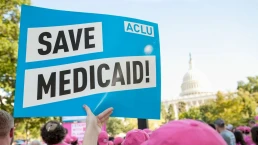Most able-bodied Medicaid recipients already have jobs, but those who don’t should receive health care too.
By Timothy Noah, The New Republic
In 2016, Charles Manson, then serving a life sentence for murdering or conspiring to murder seven people, developed a lesion on his large intestine, or possibly his colon or anus, that caused internal bleeding. The authorities, concluding that this was more than California’s Corcoran State Prison infirmary could handle, sent Manson to a private hospital in Bakersfield.
That posed no small expense to California taxpayers. Multiple uniformed state police were necessary to guard the serial killer. Manson was examined by multiple doctors, who performed a variety of tests, persuaded a reluctant Manson to undergo surgery, then changed their minds during pre-op—and not because they suddenly realized they were treating an unrepentant monster with a swastika carved onto his brow. They didn’t say, as you or I would be tempted to: “Let that son of a bitch die.” Rather, they rendered the professional judgment that Manson, then 82, was in sufficiently weak physical condition to pose an unacceptable risk of dying on the operating table. Manson died the following year after a second hospitalization.
Human beings don’t come more despicable than Manson. Yet the state of California granted him health care, free of charge. It’s something that a civilized society is called upon to do for its very worst people. Michael Moore made the same point with a comic flourish in his 2007 documentary, Sicko. Moore loaded up three boats in Miami with uninsured Americans and took them to Guantánamo Bay, where, at a detention camp situated inside America’s Navy base, Khalid Sheikh Mohammed and other imprisoned 9/11 terrorists enjoyed access to an apparently well-equipped clinic. Moore shouted through a bullhorn that he wanted for his passengers the same health benefit granted the evildoers. Naturally, he was turned away.

Moore’s point, and mine, is that it has never been the policy of the United States government to distribute health care on the basis of moral fitness. Last week’s signing of President Donald Trump’s “big, beautiful” budget reconciliation bill obliges me to add: “except for Medicaid.”
The budget bill boasts an estimated $1 trillion of savings over 10 years, achieved mostly by cutting Medicaid, according to the Congressional Budget Office, with the largest portion of the cuts attributable to a new work requirement. The CBO calculates that 4.8 million able-bodied people aged 19 to 64 will lose Medicaid coverage next year by refusing to work at least 80 hours per month and that another three million will lose Medicaid coverage for other reasons.
Kevin Hassett, the relentless sycophant who directs President Donald Trump’s National Economic Council, disputes CBO’s findings. He insists that “nobody’s going to lose their insurance” because Medicaid’s able-bodied malingerers will all get jobs. Trump’s agriculture secretary, Brooke Rollins, seemed to intimate Tuesday that these able-bodied Americans will replace millions of farm laborers whom the administration will deport!
Never mind that such claims contradict the GOP’s core message that the budget bill delivers significant spending cuts. Mia Ives-Rublee and Kim Mushino of the left-leaning nonprofit Center for American Progress, or CAP, counter Hassett by noting past experience with Medicaid work requirements in Arkansas and Georgia demonstrated that such requirements necessitate a lot of new paperwork to establish eligibility, and that the resultant bureaucratic mess creates a “significant loss … among eligible people and no significant change in employment.”
Recent Posts
New Addition to List of Nuclear Near Catastrophes
February 25, 2026
Take Action Now Debris flew for great distances — many times the distance of 270 meters to a nuclear reactor and nuclear storage facility.By David…
Gavin Newsom’s last budget belies his ‘California for All’ pledge
February 24, 2026
Take Action Now Yet, even as the state is poised to lose billions in federal funding, and millions of Californians are losing access to health care…
Israel and American Hawks are Pushing U.S. to Iran War With Catastrophic Consequences
February 23, 2026
Take Action Now At the World Health Assembly in May, member states may endorse an unprecedented strategy declaring that health is not a cost – but…
A Child’s View of the Attack on Venezuela. And a Peace Flotilla
February 23, 2026
Take Action Now Fabricio said that he and his family went out of their building and saw many people also going outside, running around, and kids…




